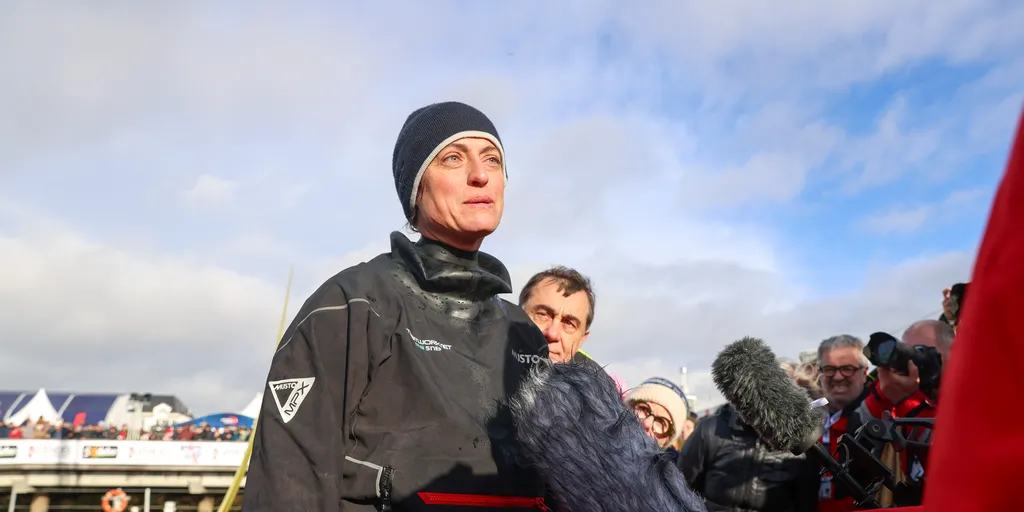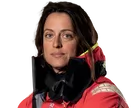Justine Mettraux : "I always feel like I'm progressing and learning"
"I enjoyed the descent of the Atlantic and even the Southern Oceans. I felt quite comfortable and I think I was managing my boat well and my strategy well. But going back up the Atlantic it was really difficult for my group – we were closehauled for a long time in very difficult conditions, including in the last days, where conditions were the hardest of the race."

Vendée Globe :
You were neck and neck with others so not always alone. Does that add to the pressure or is it reassuring to be with others?

"It’s both. It gives you comparisons in speed and knowledge of whether you make good decisions. But at the end of the race it was more pressure. Like today with Sam (Goodchild) - it's part of the game to continue in a regatta mode. Even at the end I was afraid he could overtake me and the conditions today were very unstable. Sometimes we were at 29 knots and then we were almost completely stopped – it was not simple."
Vendée Globe :
You are the first woman to finish this 10th edition. What does it represent for you?
"There is no separate ranking for the Vendee Globe - it just has a media value and a symbolic value. It's good for my sponsors because it will create more publicity about the project. More important is that for the first time there were six women with competitive projects at the start of this Vendee Globe. I'm thinking about Sam (Davies) who is not far behind and has fought a lot and Pip Hare, who we can cheer, because she’s here and will come back to the race."
Vendée Globe :
Are you transformed in any way by this Vendée Globe?
"I don't know if I have come back transformed, but when you spend so long at sea, it's a very rich experience. I feel like I have progressed in mastering the boat, to know it better and have learned many things about strategy. I also had to do a lot of maintenance and repairs, which is not my strong point, so I have progressed in different areas of preparation of the boat during this circumnavigation. It's all interesting and the next time something happens or I meet a weather situation, I will have the answer immediately.
This is what makes the richness of this sport and is why Jean Le Cam is still so competitive at the age of 65 - experience is a determining factor. I do this sport because I always feel like I'm progressing and learning things, so I liked it a lot."
Vendée Globe :
What about the mainsail problem near the finish you didn't tell us about? And what created the biggest problems?
"Partly it’s the nature of the competition, and partly because we were at the end of the race. The sail damage happened at the end of the day yesterday and we decided there wasn’t time to repair it and it didn’t change much at the end of my race.
I also had damage that we didn't speak too much about, for instance when the masthead wind sensors broke. After that I only had one sensor at deck level, on one side of the boat, so I could not use the autopilot to full effect on both tacks, as we didn’t really know the angle and speed of the wind. I could have chosen to move the sensor from side to side in manoeuvres, but that’s a risk unless it’s calm, so we decided with my team to leave it on one side."
Vendée Globe :
Tell us about the moment when you created the gap in the south with Sam Davies. Was that a decisive moment?
"I was able to stay with a weather front for several days – I was in a good place at the right moment. She was only 50 or 60 miles behind but just a little bit too far back to catch the train. I think they were sad to miss it and for me it was difficult because I was sailing tight angles, reaching in 45 knots of wind, and it was difficult to be alone there. But in the end it enabled me to create a big gap and that was decisive for me in this race."
Vendée Globe :
Your boat is the first of the last generation to cross the line. What are the differences with the latest boats?
“The IMOCAs of my generation are less comfortable and less capable in terms of top speed. There were times when I simply couldn’t keep up with the newer boats. One or two knots of difference may not seem like much, but over time it creates significant gaps.”



